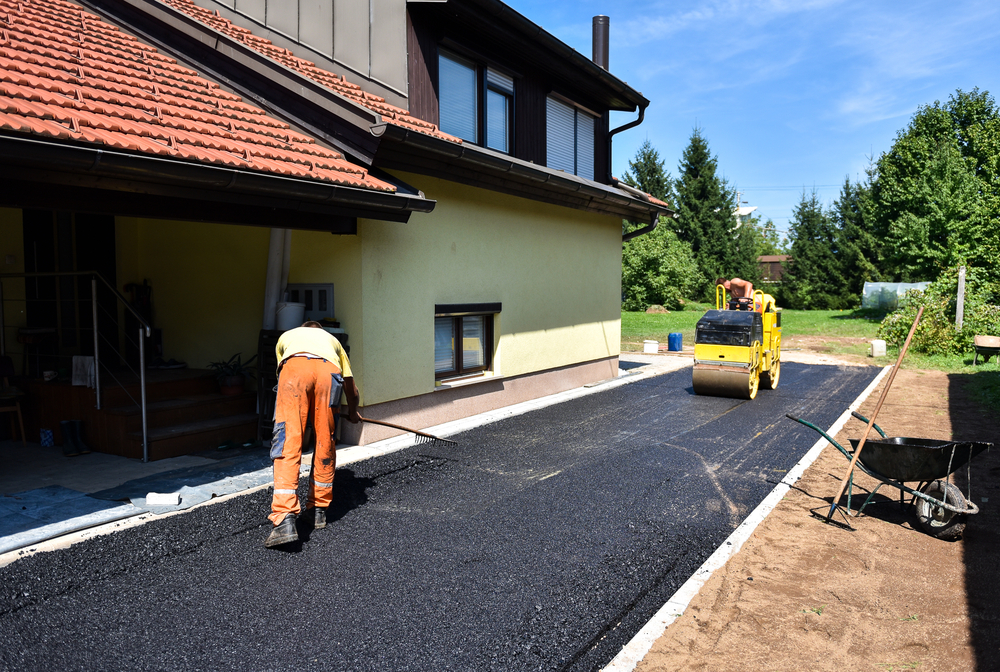Your driveway is a feature you shouldn’t need to think about once it is in place. After installing a driveway on your new home’s property, you should be able to leave it without much thought. Ideally, the driveway thickness will allow all your vehicles to drive up and down it without any issues. If the driveway thickness is not in the recommended range, problems can arise. So, how thick should an asphalt driveway be? Let’s read on to find out.
What Is the Average Driveway Thickness for a Residential Driveway?
Before answering how thick an asphalt driveway should be, it is crucial to establish a baseline for driveway thickness. Without knowing the average driveway thickness, how can you plan for the future? Driveways consist of two different sections. The first is the concrete or asphalt material that cars drive over directly. This section is four inches thick on average on American properties. However, that is not the only section of the driveway.
It also includes the base, which can be gravel or other materials. The deeper section of the driveway is usually five to five and a half inches thick. As a result, the average residential driveway in the United States is 10 to 12 and a half inches. Driveway thickness can vary based on the preference of the company building the driveway and the primary materials.
What Is the Ideal Driveway Thickness for an Asphalt Driveway?
Several things can impact the ideal thickness of your asphalt driveway. First, residential driveways are usually thinner than those used by heavy equipment. Residential driveways usually feature two to three inches of asphalt. Two inches is a safe driveway thickness for most small cars and vans. Three inches is better if you drive a large truck.
Under the asphalt, you should find six to eight inches of granular base. Beneath the granular base is the soil. Gravelly, rocky, and sandy soil is fantastic for drainage. Clay soil might need to be excavated and replaced, or it could cause problems.
Commercial driveways and parking lots need more driveway thickness and get paved with three inches of asphalt. Ideally, they will also have eight inches of granular base aggregate. Large commercial driveways and parking lots should have good drainage soil underneath the base.
Finally, heavy-duty commercial driveways and lots require more driveway thickness. Examples of heavy-duty commercial driveways include those near loading docks and those handling large trucks regularly. These driveways should get built with a four to seven inch layer of asphalt. Beneath the asphalt should be an eight inch layer of granular base aggregate to add to the driveway thickness.
What Are the Dangers of Making Your Asphalt Driveway Too Thin?
When asphalt gets installed properly, the driveway thickness and flexibility help spread out the weight of the load. It is supported by the base layer beneath, and there is less of a risk of damage to the surface layer of asphalt. However, when asphalt driveways are made too thin, issues can arise.
If the asphalt layer of your driveway is too thin, the weight of a car or heavy machinery can cause the asphalt to flex and pull apart. As a result, small cracks can start to appear. Small cracks are not a problem alone, but repeated pressure from vehicles will cause these cracks to grow.
It is crucial to note that the first cracks to appear will not be visible. These cracks are not even on the surface. Instead, they will exist beneath the surface level of asphalt. However, as more pressure gets put on the asphalt, it can spread upwards and upwards. Eventually, it will spread far enough to cause large cracks on the surface. When this happens, you will have no choice but to increase your driveway thickness through repairs.
How Thick Should an Asphalt Driveway Be, and What Are the Problems with Making Your Asphalt Driveway Too Thick?
When you hear about the problems arising from having too thin an asphalt driveway, you might think it is better to make it as thick as possible. Unfortunately, having too thick a driveway can also cause problems. If you make your asphalt driveway extra thick, it will not get supported by the granular base layer. As a result, the asphalt can compress on itself and make the driveway not as flat as you like. Furthermore, it is challenging to install asphalt correctly if it is very thick. Asphalt must be layered properly, or there will be long-term issues. So, sticking to the ideal driveway thickness is a must.
Install Your Asphalt Driveway with the Proper Thickness
Paving a driveway is not the most enjoyable thing, but it must get done. Fortunately, there are not many things to manage. However, you must ensure your driveway is the proper driveway thickness. Depending on if it is residential or commercial, there are different ideal thicknesses. Contact Richfield Blacktop today to learn more about asphalt driveway thickness.






